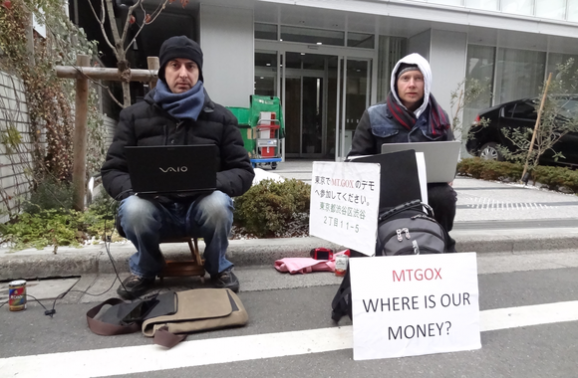Bitcoin’s Hard Times Continue
This article is more than 2 years old
 Bitcoin—the digital crypto-currency hailed as the money of the future for its lack of affiliation with banks or third parties, and its convertibility into any currency—has fallen on hard times lately. The bankruptcy of Mt. Gox, the largest Bitcoin exchange—accounting for about 70% of all Bitcoin transactions—has only marked the beginning of a rough go for the currency, a run that only appears to be getting worse.
Bitcoin—the digital crypto-currency hailed as the money of the future for its lack of affiliation with banks or third parties, and its convertibility into any currency—has fallen on hard times lately. The bankruptcy of Mt. Gox, the largest Bitcoin exchange—accounting for about 70% of all Bitcoin transactions—has only marked the beginning of a rough go for the currency, a run that only appears to be getting worse.
The Toyko-based Mt. Gox, which had about a million customers at the end of 2013, suspended withdrawals of bitcoins on February 7 because of transactional security flaws. 18 days later, the site went silent. Three days after that, the company declared bankruptcy, having lost 850,000 bitcoins (100,000 of which were its own) valued at just under half a billion dollars. The company couldn’t account for the disappearance of the money—some are calling fraud, others think it was poor management, and more are looking at theft.
In June of 2011, hackers uses stolen passwords to make off with about $9 million worth of bitcoin, but apparently the company didn’t tighten security enough after that attack. An investigation is under way, and Mt. Gox is considering filing a criminal complaint, and class action lawsuits have been also been filed.
 Just three days ago, Flexcoin announced that it, too, is shutting down, having been hacked and robbed of nearly $600,000 worth of the digital currency. Bitcoins held in cold storage, or offline reserves, weren’t accessed, but all coins in the “hot wallet” were. An update on the site explains the hacker’s methodology, and acknowledges that, “We’ve failed our customers, our business, and ultimately the Bitcoin community.” Poloniex was also recently hacked, losing just under $50,000.
Just three days ago, Flexcoin announced that it, too, is shutting down, having been hacked and robbed of nearly $600,000 worth of the digital currency. Bitcoins held in cold storage, or offline reserves, weren’t accessed, but all coins in the “hot wallet” were. An update on the site explains the hacker’s methodology, and acknowledges that, “We’ve failed our customers, our business, and ultimately the Bitcoin community.” Poloniex was also recently hacked, losing just under $50,000.
And things get even worse. Yesterday saw reports about the investigation of the February 26th death of Autumn Radtke, CEO of First Meta, a Singapore-based company that provides virtual current trade, exchange, and management systems. Radtke’s death has been under investigation. Initial reports claim suicide, but they were then revised to state that it’s not certain how she died, only that she was “found dead at the bottom of an apartment block”. The death is being called “unnatural,” though preliminary reports indicate no foul play. First Meta created the first virtual credit card in 2008, and has been a frontrunner in virtual currency services.
Then, in the weirdest twist of all, the man Newsweek identified as the creator of bitcoin denied his involvement with the currency, jumped in his car, leading reporters on a high-speed chase through LA. The magazine continues to assert that Satoshi Nakamoto is indeed the founder of bitcoin, but if the digital wallet doesn’t fit…
 Despite all the recent problems dogging the virtual currency, diehards believe this is the price of getting in on the ground floor of the next evolution of money. Currently, one bitcoin is worth $626, down from its high of $800, but up from $500. Recently, the Winklevoss Twins, the evil duo from the Social Network who sued Mark Zuckerberg over Facebook, purchased two tickets to space on Virgin Galactic. I’ll give you three guesses as to how they paid for those tickets. “Since their inceptions, bitcoin and Virgin Galactic have been writing the next chapter in our history books,” the moguls said. At one point, they owned about 1% of the total bitcoins in circulation—more than any other single investor—and are seeking to establish the Winklevoss Bitcoin Trust. Maybe they just want to sue whoever keeps stealing the digital currency.
Despite all the recent problems dogging the virtual currency, diehards believe this is the price of getting in on the ground floor of the next evolution of money. Currently, one bitcoin is worth $626, down from its high of $800, but up from $500. Recently, the Winklevoss Twins, the evil duo from the Social Network who sued Mark Zuckerberg over Facebook, purchased two tickets to space on Virgin Galactic. I’ll give you three guesses as to how they paid for those tickets. “Since their inceptions, bitcoin and Virgin Galactic have been writing the next chapter in our history books,” the moguls said. At one point, they owned about 1% of the total bitcoins in circulation—more than any other single investor—and are seeking to establish the Winklevoss Bitcoin Trust. Maybe they just want to sue whoever keeps stealing the digital currency.












